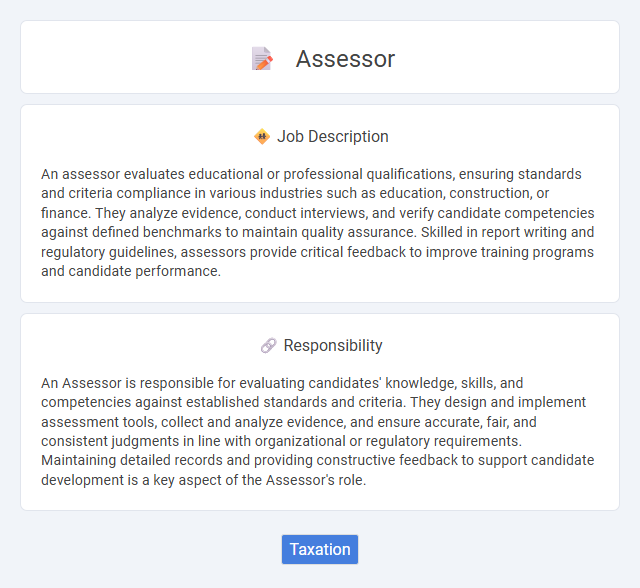
An assessor evaluates educational or professional qualifications, ensuring standards and criteria compliance in various industries such as education, construction, or finance. They analyze evidence, conduct interviews, and verify candidate competencies against defined benchmarks to maintain quality assurance. Skilled in report writing and regulatory guidelines, assessors provide critical feedback to improve training programs and candidate performance.
People with strong analytical skills and attention to detail will probably find the Assessor job suitable, as it requires evaluating information accurately. Those comfortable working independently and handling responsibility may likely thrive in this role. Conversely, individuals who struggle with decision-making or prefer collaborative environments might find this job less fitting.
Qualification
An Assessor typically requires a combination of relevant industry experience and formal qualifications such as a Level 3 Award in Assessing Competence in the Work Environment (ACWE) or a Level 3 Certificate in Assessing Vocational Achievement (CAVA). Strong knowledge of the specific sector they assess, whether in education, construction, or healthcare, enhances their ability to evaluate candidates effectively. Continuous professional development and understanding of assessment standards and compliance frameworks are essential to maintain accuracy and credibility in their evaluations.
Responsibility
An Assessor is responsible for evaluating candidates' knowledge, skills, and competencies against established standards and criteria. They design and implement assessment tools, collect and analyze evidence, and ensure accurate, fair, and consistent judgments in line with organizational or regulatory requirements. Maintaining detailed records and providing constructive feedback to support candidate development is a key aspect of the Assessor's role.
Benefit
An Assessor role likely offers benefits including the opportunity to develop expertise in property valuation and risk assessment, which can enhance career prospects. The position probably provides exposure to various industries, contributing to a diverse skill set valued by employers. Competitive compensation and the chance to work independently or within a team might also be significant advantages of this job.
Challenge
The role of an assessor likely presents significant challenges in accurately evaluating diverse skills and competencies within strict time constraints. It probably requires a keen eye for detail and the ability to maintain unbiased judgment under pressure. Navigating complex evaluation criteria while ensuring consistency may be a common obstacle faced in this position.
Career Advancement
Assessor roles offer significant career advancement opportunities through specialization in property valuation, risk management, and taxation. Progression can lead to senior assessor positions, supervisory roles, or transitions into related fields such as real estate consultancy and public administration. Continuous professional development and certification enhance promotion prospects and salary growth within local government or private sector organizations.
Key Terms
Taxation
An Assessor specializing in taxation plays a critical role in evaluating property values to determine accurate tax liabilities for individuals and businesses. This position requires deep knowledge of local tax codes, property laws, and economic factors that influence market value assessments. Expertise in data analysis and regulatory compliance ensures fair and equitable tax distribution within municipalities.
 kuljobs.com
kuljobs.com